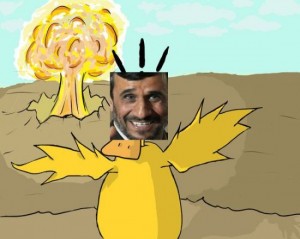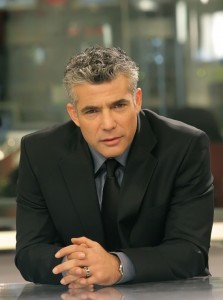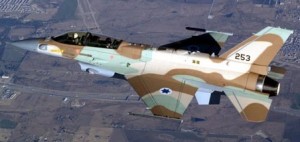Amir Mizroch
10 lessons from the Gaza fighting so far
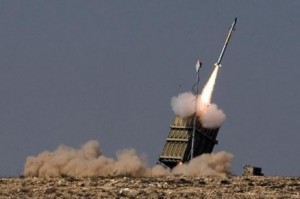
So what have we learned from this latest round of fighting so far?
1. While the Iron Dome anti-rocket system is a big hit in battle with the relatively small Islamic Jihad group [it has frustrated their plans and provided the Israeli government with time and space not to launch a heavier assault on Gaza], it won’t stand up to a massive and sustained rocket barrage from the much larger, much more heavily-armed Hamas. Like King David and King Saul, Islamic Jihad has thousands of rockets, and Hamas has tens of thousands of rockets. If the Iron Dome won’t stand up to a massive and sustained rocket barrage from the relatively small Hamas terrorist group, it definitely won’t stand up to a massive and sustained rocket barrage from the Hezbollah terrorist group. If the Iron Dome won’t stand up to a massive and sustained rocket barrage from the relatively small Hezbollah terrorist group, it definitely won’t stand up to a massive and sustained rocket barrage from the Syrian army. The Iron Dome is a smart, but limited tool, effective only in a limited conflict.
2. In short, politicians’ call to produce more Iron Domes systems is cheap populist talk: the economies of scale and terror in these parts guarantee that Israel will never have enough Iron Domes to effectively protect its civilians from massive and sustained rocket attacks. Each Kassam and Grad rocket costs up to a thousand dollars and every Iron Dome interceptor missile fired at a Grad costs 40,000 dollars. We’ll spend ourselves into a recession and still not have enough interceptors. It costs $45 million to produce an Iron Dome battery. You do the math. While it’s a lifesaver for many people in the south now, it won’t deliver bang for its buck in a larger battle. It’s unsustainable.
3. Iron Dome batteries are effective for small-scale battles against small terror groups like the Popular Resistance Committees and the Palestinian Islamic Jihad. They are not effective against large terror groups and armies with tens of thousands of rockets in their arsenals. To deal with these threats, Israel has to strike in a way that makes it not cost-effective for the other side to fire its rockets. And that means that, apart from striking very hard at the terrorist leadership and infrastructure, the IDF has to sow massive damage to the civilian infrastructure of the areas under the control of the terror groups until they are unable to care for the civilians under their aegis. In any case, Hezbollah and Hamas fire from within civilian areas using them as human shields, and are thus forfeiting their lives. But this obviously then, puts Israel in a no-win situation: it creates a humanitarian disaster in Gaza and southern Lebanon, brings down world condemnation, and is forced into a ceasefire before it can exact a steep enough price from the enemy. Israel is then forced into a shape it doesn’t want to get into, like chasing rocket squads in built-up areas – which is the kind of warfare Hamas and Hezbollah want to drag the IDF into.
4. The mantra from the government and the IDF is that the resilience of the home front is the wind in the sails of the fighting armed forces. If that is truly the case, then the constant reports coming in of damaged bomb shelters is very worrying. Every day we’re hearing reports of shelters without water, electricity, toilets and such amenities. Some shelters have been taken over by civilians and turned into storage rooms or being used as synagogues. The government, through the police and the local authorities, need to go to every single public bomb shelter and make sure it is open, equipped and ready for use. Otherwise expect chaos in the home front, and massive pressure on the government to bring any fighting to a sudden halt. READ MORE
It’s a bird. It’s a plane. It’s Ahmadineduck!
Prime Minister Benjamin Netanyahu told the AIPAC conference in Washington this morning that there are still people who believe that Iran is not working to develop nuclear weapons:
Amazingly, some people refuse to acknowledge that Iran’s goal is to develop nuclear weapons. You see, Iran claims to do everything it’s doing, that it’s enriching uranium to develop medical isotopes.
Yeah, that’s right.
A country that builds underground nuclear facilities, develops intercontinental ballistic missiles, manufactures thousands of centrifuges, and that absorbs crippling sanctions, is doing all that in order to advance…medical research.
So you see, when that Iranian ICBM is flying through the air to a location near you, you’ve got nothing to worry about. It’s only carrying medical isotopes.
Ladies and Gentlemen,
If it looks like a duck, walks like a duck, and quacks like a duck, then what is it?
That’s right, it’s a duck. But this duck is a nuclear duck.
So, ladies and gentlemen, I present you with the Iranian nuclear duck. I call him: Ahmadineduck!
The handshake that launched a thousand planes?
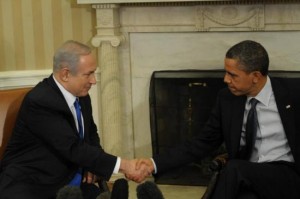
This is the picture released today by the Israeli Government Press Office after the meeting between Prime Minister Benjamin Netanyahu and US President Barack Obama.
From looking at the picture, and from reading the remarks, it seems to me that the two men have not come to an agreement that whittles down the grey area between the two countries’ red lines on Iran. Obama went through his main talking points clearly: there is still time for a diplomatic solution, and for sanctions. The military option remains firmly on the table; and that Israel should trust him that when it comes to Israel’s security, “America has Israel’s back,” he says.
Netanyahu’s main point is that Israel reserves the right to act as it sees fit to remove any existential threat. It is the master of its own fate, Bibi says.
Obama wants Netanyahu to wait, and Netanyahu wants Obama to act now, or at least not get in Israel’s way.
No common ground on this main issue.
The picture shows a strong handshake, with both men pursing their lips, both men coming from a strong position. They’re both completely convinced of their position. Both men look determined, and entrenched.
And so if that is the case, my assessment is that Netanyahu will not let Israel’s window of opportunity for an attack against Iran’s nuclear facilities close. He will not take the leap of faith that Obama has asked him to take. The essence of Netanyahu’s message is that “you cannot ask us to put our fate into your hands. The whole point of the Jewish state is that we don’t ever have to do this.” READ MORE
Stop worrying and love the Iranian bomb
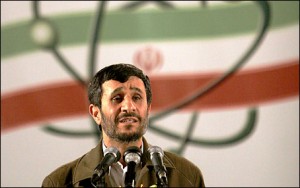
In the run-up to the 2009 general elections opposition leader Binyamin Netanyahu criss-crossed the world saying the year was 1938. “It’s 1938 and Iran is Germany. And Iran is racing to arm itself with atomic bombs,” Netanyahu told delegates at the annual United Jewish Communities General Assembly. “Believe him and stop him,” he said of Iranian President Mahmoud Ahmadinejad. “This is what we must do. Everything else pales before this.” While the Iranian president “denies the Holocaust,” Netanyahu said, “he is preparing another Holocaust for the Jewish state.”
A YEAR AND A HALF later and we are deep into 1939.
Israel’s, and the world’s, failure to stop Iran from achieving a nuclear breakout capacity is now a sad and undeniable fact.
While the Iranians were somewhat slowed down in their progress (some experts say that had it not been for various covert sabotage operations they would have reached breakout two years ago), they finally got there.
The Iranians now have all the components they need to independently build nuclear weapons. They have thousands of scientists working at multiple facilities across Iran; they have all the enrichment hardware they need (their software recently took a bit of a knock, but once the “bug” was discovered and sealed they continued apace); they have advanced missiles of varying ranges; and now all they need to do is enrich to weapons grade levels and put a warhead on a missile.
This is not a simple process, but the Iranians can do it, by themselves, whenever they choose to. They have all three necessary elements and now all that they need to do is to take the political decision to put a couple of bombs together and become a regional hegemonic power. They achieved this by spreading their nuclear program broadly, over multiple facilities, with slow and methodical progress. READ MORE
Lapid: Moses, Obama, or just Yair?
Just attended a meeting with Yair Lapid at the Sanhedrin Forum in Tel-Aviv; a forum of young professionals that meets about once a month with top Israeli and international opinion makers in an informal setting.
My impressions of the journalist-celebrity-turned-aspiring politician:
He’s oozing charisma. In this way he reminds me a lot of Barack Obama when he was campaigning for the Democratic nomination. Lapid is engaging, funny, intelligent, and shoots straight. The man certainly has rhetorical skills.
What I like about him more than his charisma is that it’s quite clear that he’s human, just a human. While most of the time he can be erudite in explaining what’s wrong with the Israeli political system and what he plans to do to fix it, at other times he stumbles, shyly, because he doesn’t have all the answers. At those moments when he’s in uncomfortable territory, he’s endearing in that he tries; he looks like a man who knows that he needs to start taking this politics thing seriously now that he’s in it.
At other times one wonders if he really knows what he’s doing and what cesspool he’s jumping into. He’s not the first journalist to enter politics with an attitude of “I know how to fix this system because I’ve been reporting on its faults for so long” – only to then slip into the Knesset inside a small or medium-sized party and be swallowed up by the system. That’s what happened to his dad.
Which brings me to an important point: in my previous postings about Lapid, I wrote that I thought he was making a mistake by establishing a new political party instead of joining an existing party like Kadima or Labor. I argued that in essence, what Lapid would be doing is further fragmenting the center-left political bloc [which would total roughly 30-38 mandates] thus ensuring that the Likud would win the next election and could, if it wished to, choose the exact same coalition to govern. Not that I’m picking sides, but doing this would negate Lapid’s stated intention of being an agent of change. He would also inject yet another political party into the already crowded and sectorial political system, making it even harder for a ruling coalition to govern and giving rise to a slew of private interest legislation. So tonight, when Lapid was asked why he didn’t join an existing party, he said that there were simply no parties in the current system that he could identify with; that they were all rotten to their core, that they were staffed by people of the past who hop from one party to another because all they’re interested in is maintaining the status quo, and their jobs. READ MORE
Love in the time of Uranium
“America’s commitment and my commitment to Israel and Israel’s security is unshakeable. It is unshakeable. I am proud to say that no U.S. administration has done more in support of Israel’s security than ours. None. Don’t let anybody else tell you otherwise. It is a fact. We are determined to prevent Iran from acquiring nuclear weapons. And that’s why, rest assured, we will take no options off the table.” – US President Barack Obama, December 17, 2011
A war-weary gentleman holds his young, tempestuous, and fiery lover close, in a warm, yet slightly too strong embrace, not only out of mutual respect and love but, lately, mainly out of real concern that his young lover could break his grip and dash across the room to attack the ugly man standing in the corner; that smirking stranger playing with himself, growing larger and larger, panting, frothing, disgusting, taunting the young woman, threatening to explode all over her. That ugly man has been making lewd gestures at her, and she is frightened that he will come and take her when her lover is not looking, when he’s distracted or asleep. The beautiful young one tells her older lover that she will not leave him, will not just disappear into the night, that she won’t, out of fear and desperation, lash out at her tormentor alone, that she will always remain close, always in contact, that she will keep her cool, and that if she goes out for the night, she’ll tell him where she’s going and when she’ll be back. But she also says that she has to go out into the night; it’s coming, it’s calling her, that she’s been hurt before, deeply hurt, that she’s afraid of the ugly man in the corner; she can’t sleep because of the ugly man in the corner; she wants him gone, gone now… he’s coming to get me, he’s promised to do terrible, horrible things to me….I can’t live, I can’t breathe as long as he’s out there…playing with that thing…that disgusting thing…I can’t take my eyes off it, and he is not taking his eyes off me…I can’t stay with you if you don’t take care of him….I won’t….take him away from me forever…and if you can’t, or won’t, then let me go. Now. READ MORE
On the couch with Bibi Netanyahu

Prime Minister Benjamin Netanyahu at his weekly therapy session.
Prime Minister Benjamin Netanyahu: Doc, you don’t know how much I needed this session today. I’m a wreck.
Psychologist: I’m sorry to hear that. What’s going on?
PM: It’s happening again. I feel like I’m fighting with everyone. I feel like I can’t trust anyone. I’m angry all the time. I’m scared.
Psychologist: We’ve spoken about your trust issue here before, several times.
PM: Yes. I know. It’s come up again, I’m left with nobody to trust, no one to confide in.
Psychologist: Tell me what happened.
PM: They took away Nathan. Can you believe it? Let me tell you, that was a total shock. I saw it on TV. On TV! My Nathan, on TV! I was in shock. It’s not good for a Prime Minister to be in shock. And Nathan! My right-hand man and my left-hand man. He’s the only one who knew what the right hand and left hand were doing. My main man. The only one I really could trust from that whole gang. Hendel! Couldn’t trust him. He was too good-looking. He was too serious looking. Too seriously good-looking. He stabbed me in the back. He had to go. I showed him the door the same way I heard about Nathan’s story: on TV. Ha! Showed him. Hendele comes to me, says he’s sorry about how it all came down. I says to the guy: ‘it’s all wrong what you did. I have absolutely no faith in you anymore. None.’ So he says: ‘Ok, well, in that case, I’ll resign immediately.’ And I says to the guy: ‘Ok, but let’s announce it in a day or two, once I find a replacement.’ And then you know what I did doc? I leaked it straight to the TV! Shame, poor Hendele, never knew what hit him. What goes around comes around, that’s what dad always says. And Zvika, I showed him the door too, on live TV. I let him have it. ‘Lock the door, just lock it, why can’t you just do what I tell you to do?’ Poor Zvika, he still hasn’t gotten the message. Wait until he tries to get a spot in the Likud, that will be something heheh.
Psychologist: You’re very angry. I heard they said that they had your best interests at heart. Are you maybe being too harsh?
PM: Rubbish. Of course I’m angry. I’m not being harsh enough. I could be much, much harsher, believe me. But we are in a vibrant democracy after all. The only one in the Middle East. These guys, these jokers, Hendel, Hauser and Locker betrayed my trust. They went behind my back doctor. They deserve to get booted out. I can’t work with people like that.
Psychologist: Let’s get back to Eshel. Why are you so upset about him? I mean, he did after all harass a member of your staff. He did take inappropriate photos of her. He hacked into her mail. This man was obviously creating an unhealthy atmosphere in your office, and, in a sense, now that he’s gone, the unhealthy atmosphere is also gone. You should be happy about that. Perhaps not at the way it was done, but the final result is the same. But you’re really upset about losing him, aren’t you. disproportionately upset, aren’t you? Let’s explore that.
PM: They took away my Eshel. My Eshel, he was mine. My loyal, loyal Eshel. Loyalty like that comes around once, maybe twice in a prime ministerial term. I trusted him like I trust you. I told him everything. He’s done so much for me, for my office, for this country, for the Likud. It’s a tragedy. I’m in grief. I’m grieving doctor. So is Sarale.
The truth about our next war
The truth about our next war is that it may not happen at all. It’s shaping up to be big enough and ugly enough to make all sides lose their appetite for it. It may not happen, even though it looks and feels like it is going to happen.
The truth about our next war is that if it does break out, there will be another war after it. Neither side is going to really win, win in the old-school sense of the word. And in the absence of closure, there will be another round, and another round.
The truth about our next war is that we won’t win. All the bad guys need to do is stay alive, survive, hold out – and they will claim victory. There will be many around the world who agree with them. That’s our enemies’ logic, and their plan. We will hurt them very, very badly, but we won’t “win” in the classic sense of the term. We won’t win because there is nothing to win: there is no High Command bunker to storm, no king to capture, no castle to plant our flag on. None of our enemies will admit defeat and sign a declaration of unconditional surrender. They would rather die. And we will oblige them. The best we can hope for is to kill very senior terror leaders. That will give us some good victory shots and make us feel like we’re winning. But there will be others that take their place, and they won’t stop attacking us.
Budget Blah Blah

Prime Minister Benjamin Netanyahu should really put an end to the constant bickering between the Treasury and the Ministry of Defense over the defense budget. Bibi should sit down with Stenitz and Barak, come up with a compromise, decide on a budget, implement it, and shut them up. As things stand now, Israelis are bombarded every day with media reports of savage accusations and recriminations between the ministers of defense and finance. Every Tuesday and Thursday [and twice on Sundays] the ministry of defense says it has no money, so it’s going to cut back on training, cut back on weapons procurements, cut back on important R&D. The MOD and the army accuse the Finance Ministry, who is demanding a defense budget slash and more transparency and efficiency in the MOD, of playing with Israelis’ lives, of irresponsibly placing the country’s security at risk, especially now, when things are so uncertain. The Treasury, for its part, responds every Tuesday and Thursday [and twice on Sundays] that the MOD is using scare tactics to extort more money from the nation’s coffers. Barak and Steinitz are locked in an ego battle over whose boss.
Enough is enough. Instead of boosting our confidence as the war clouds gather, the government is undermining our confidence.
In escalating shadow war, Israel emerging victorious

Let’s take score so far:
While foreign sources credit Israel with planting the Stuxnet computer worm that forced a long delay in the operations of the Natanz nuclear facility, Iran has struggled to do significant damage to Israel’s computer infrastructure, even though its hackers are reportedly trying very hard.
Several Iranian nuclear and military facilities, including a factory for the production of long-range rockets, have been blown up. Dozens of very senior Iranian Revolutionary Guards commanders have been killed in these explosions, and others have died when their military transport planes mysteriously crashed.
Even Iran’s drive to arm Hezbollah and the terrorist organizations in Gaza has run into difficulties. Iran’s planes and ships have been intercepted in Turkey, Cyprus, Nigeria and other places. Its weapons convoys have been bombed in Sudan, and its smugglers have been killed in Sinai.
Even though its proxies do have more rockets than most conventional armies, Iran wants Hamas, Islamic Jihad and Hezbollah to have much, much more.
